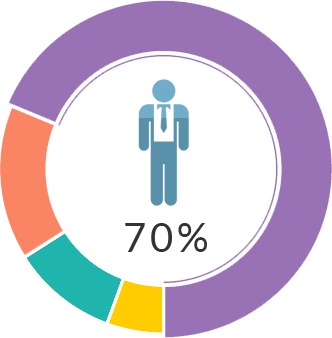Identify Candidates Who “Fit” The Job
Career Success Predictor
Matching the right person with the right job or career can have a significant impact on both employee and employer. For the employee, finding the right person-career match can drastically affect his/her income, social status, friends, family life, job and general life satisfaction. For the employer, appropriately matching employees with the job they will be performing can lead to increased job satisfaction and morale, resulting in increased productivity and decreased turnover.
PsyMetrics’ Career Success Predictor assesses an individual’s interests in terms of how they match the specific occupational environment they will be working in. Based on factor analytic research, psychologist J. L. Holland developed a six-factor model widely used today in career assessment. This model suggests there are six occupational environments and each is associated with a particular set of personal interests.
Below are the six versions of the Career Success Predictor, one for each occupational environment. Once you identify the environment(s) the candidate is being evaluated for, the appropriate version(s) is administered to the candidate to determine the degree of fit between the candidate’s interests and the job he/she is being considered for.
The full version of the Career Success Predictor (assessing the fit within all six environments) is also available for individuals who would like guidance as to what occupations best fit their personal interests and therefore potentially leading to higher levels of job satisfaction and career success. The report generates a score for each of the six environments and suggestions for specific occupations that best match their interests.

Features
This test is ideal for organizations wanting to identify individuals with the required interest level to perform the job they are being considered for. This assessment is a measure of job fit. Excellent for all job levels (i.e., entry level through managerial).
Test Details
- Job Satisfaction
- Job Interest
- Likelihood of changing jobs
- Overall Job Performance
Realistic Environment:
This occupational environment generally requires manual or physical activities. It requires the use of tools, equipment or machines. This environment generally involves working with things rather than people. These occupations require mechanical and/or technical skills and may require working outdoors. This occupation group usually encompasses blue-collar jobs and a few technical positions (e.g., some types of engineers).
Investigative Environment:
This occupational environment includes most scientific professions (e.g., physicians, biologists, laboratory technicians, researchers). These occupations require analytical and problem solving skills. They also require a hunger for knowledge. The emphasis is on ideas rather than people. Proficiency in mathematics and statistics is usually required. Intellectual skills in this occupational group are very important for job success.
Artistic Environment:
This occupational environment requires working with and through various media to express oneself. Creativity and originality are often associated with this environment. Typical artistic occupations include actor, musician, copywriter, architect, photographer.
Realistic Environment:
This occupational environment generally requires manual or physical activities. It requires the use of tools, equipment or machines. This environment generally involves working with things rather than people. These occupations require mechanical and/or technical skills and may require working outdoors. This occupation group usually encompasses blue-collar jobs and a few technical positions (e.g., some types of engineers).
Investigative Environment:
This occupational environment includes most scientific professions (e.g., physicians, biologists, laboratory technicians, researchers). These occupations require analytical and problem solving skills. They also require a hunger for knowledge. The emphasis is on ideas rather than people. Proficiency in mathematics and statistics is usually required. Intellectual skills in this occupational group are very important for job success.
Artistic Environment:
This occupational environment requires working with and through various media to express oneself. Creativity and originality are often associated with this environment. Typical artistic occupations include actor, musician, copywriter, architect, photographer.
Test Details – Per Environment Version
- 10 questions
- Untimed (approximately 2 minutes)
- Online administration
- Immediate score report
- Management Suggestions
Test Details – Full Version
- 60 questions
- Untimed (approximately 10 minutes)
- Reliability check
- Online administration
- Immediate score report
- Management Suggestions
- List of suggested jobs based on interests
Benefits Of Hiring Applicants Whose Interests Match Their Current Occupational Environment as assessed by the career success Predictor


